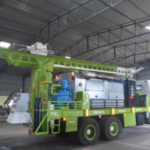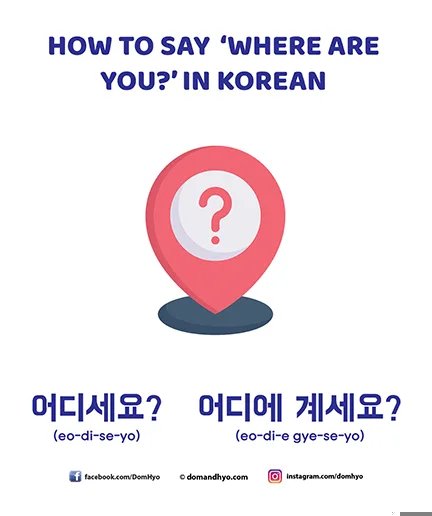Whether you’re traveling to South Korea or simply engaging with Korean speakers, knowing how to ask “where are you in Korean” can enhance your conversations. The phrase you need is “어디에 있어요?” (eodie isseoyo?), a simple yet effective way to connect with others.
Using this expression opens up opportunities for meaningful interactions. It shows your interest in the other person’s location, sparking dialogue and building relationships. With just a few words, you can navigate social situations and feel more comfortable in a new environment.
“`html
Where Are You in Korean?
If you’re learning Korean or planning a trip to Korea, knowing how to ask “Where are you?” is very important! This phrase can help you communicate effectively with locals and navigate your way around. In this section, we’ll dive deep into how to say “Where are you?” in Korean, along with its variations and contexts of use.
The Basics: Saying “Where Are You?” in Korean
In Korean, “Where are you?” translates to “어디에요?” (eodieyo?). Here’s how to break it down:
– **어디** (eodi) means “where”
– **에요** (eyo) is a polite ending that adds respect to your question.
When you combine these two, you get “어디에요?” (eodieyo?), the polite way to ask someone where they are.
When to Use “어디에요?”
Understanding when to use “어디에요?” can enhance your conversations. Here are some scenarios:
- Asking a Friend: If you’re looking for a friend in a busy area, simply say, “너 어디에요?” (neo eodieyo?), which is a more casual form.
- In a Formal Setting: When speaking to someone older, use “어디에요?” to show respect.
- In Restaurants or Stores: If you need assistance finding a place or item, use this phrase to ask an employee.
Variations of “Where Are You?” in Korean
Different contexts may require different forms of the phrase. Here are some variations you might encounter:
Casual Forms
When you’re with close friends, you can use:
– **어디야?** (eodiya?) – This is an informal way to ask “Where are you?”
Different Situational Uses
In various scenarios, you can adjust your question slightly:
– **여기는 어디예요?** (yeogineun eodieyo?) – “Where is this place?” Useful when you’re lost in a location.
– **당신은 어디에 계세요?** (dangshineun eodie gyeseyo?) – “Where are you?” Formal and polite.
Related Vocabulary: Directions and Locations
When you ask “Where are you?”, you may also want to ask for directions. Here are some words and phrases that can come in handy:
- 왼쪽 (oenjjok) – left
- 오른쪽 (oreunjjok) – right
- 앞 (ap) – front
- 뒤 (dwi) – back
- 위 (wi) – on top
- 아래 (arae) – below
You can combine these with location words to ask more specific questions, such as “Where’s the bank?” (은행은 어디에요? – eunhaengeun eodieyo?).
Examples in Conversations
Real-life conversations help in understanding how to use “Where are you?” Let’s look at some examples:
Scenario 1: Meeting a Friend
You text your friend:
– **너 어디야?**
Your friend replies:
– **카페에 있어.** (Cafe-e isseo.) – “I’m at the cafe.”
Scenario 2: Asking for Directions
You see a local in the street:
– **실례하지만, 은행은 어디에요?**
The local responds:
– **저기 앞에요.** (Jeogi ap-e-yo.) – “It’s right over there.”
Understanding Cultural Relevance
Language learning isn’t just about words; it’s also about culture. In Korea, politeness is key. When you ask “Where are you?” be mindful of your tone and the context. Using the formal versions with people you don’t know is a must for a good impression.
Politeness in Korean
Korean culture places a high value on respect and politeness. Here’s how it reflects in your conversation:
- Using formal language with strangers or elders shows respect.
- Casual language should be reserved for friends or younger individuals.
Common Situations to Use “Where Are You?”
Let’s explore some everyday situations where you might need to use “어디에요?”:
Traveling
When you’re traveling in Korea, you may find yourself lost or looking for a specific place. Here’s how you can use the phrase:
– **호텔이 어디에요?** (hoteleun eodieyo?) – “Where is the hotel?”
– **역은 어디예요?** (yeogeun eodieyo?) – “Where is the station?”
In a Social Setting
When you’re meeting friends or attending events, knowing how to ask about locations can make mingling easier:
– **파티는 어디에요?** (patineun eodieyo?) – “Where is the party?”
– **어디서 뭘 해?** (eodiseo mwo hae?) – “Where are you doing what?”
In Class or Educational Settings
If you’re in a language class or a cultural exchange, asking classmates where they are can help build friendships:
– **지금 어디에 있어요?** (jigeum eodie isseoyo?) – “Where are you right now?”
Practice Makes Perfect
To feel comfortable with “Where are you?” in Korean, practice is key. Here are some helpful tips:
- Use Flashcards: Write “어디에요?” and other related phrases on flashcards to practice.
- Speak with a Native: Find a language partner or tutor to practice speaking.
- Try Apps: Language learning apps are great for practicing vocabulary and pronunciation.
Practice Exercises
Here are some practice exercises you can try with friends or on your own:
Exercise 1: Fill in the Blanks
Translate the following:
1. Where are you going? – _____________?
2. Where is the restaurant? – _____________?
Exercise 2: Role-Playing
Pair with a friend and take turns asking each other where you are in different scenarios, like at a park or a shopping mall.
Learning how to ask “Where are you?” in Korean is a great stepping stone in your language journey. This phrase can help you make connections, explore new places, and better understand Korean culture. Whether you’re traveling, making new friends, or just learning for fun, knowing this simple question enhances your communication skills and enriches your experience. As you practice, remember to respect the cultural nuances of the language. Happy learning and use “어디에요?” confidently wherever you go!
“`
LEARN KOREAN PHRASES: "Where are you" in Korean: Informal, formal, honorific
Frequently Asked Questions
How do you ask someone their location in Korean?
To ask someone where they are in Korean, you can say “어디에요?” (eodieyo?). This phrase translates to “Where are you?” in English and is a polite way to inquire about someone’s location. You can also use “어디 있어요?” (eodi isseoyo?), which means “Where are you?” and is similarly polite.
What is the importance of knowing directions in Korean?
Knowing directions in Korean is essential for navigating around Korea, whether you are traveling, living, or exploring the culture. It helps you communicate effectively with locals, ask for assistance, or follow instructions. Mastering phrases related to directions can enhance your overall experience in a Korean-speaking environment.
Can you provide some other useful phrases related to location in Korean?
Certainly! Here are a few useful phrases related to location in Korean:
– “저는 [place]에 있어요.” (jeoneun [place]e isseoyo) meaning “I am at [place].”
– “어디로 가야 해요?” (eodiro gaya haeyo?) meaning “Where do I need to go?”
– “왼쪽으로 가세요.” (oenjjogeuro gaseyo) meaning “Go left.”
These phrases can help you navigate more easily when you need to express your location or ask for directions.
What are some common responses when someone asks “Where are you?” in Korean?
When someone asks “어디에요?” (eodieyo?), you can respond in various ways depending on your location. For example, if you are at home, you can say “집이에요.” (jib-ieyo), which means “I am at home.” If you are at school, you can say “학교에 있어요.” (hakgyo-e isseoyo), meaning “I am at school.” These responses help you communicate your current location effectively.
How do you indicate a specific location in Korean?
To indicate a specific location in Korean, you can combine the word for the location with “에” (e), which denotes the target of the action. For example, to say “at the park,” you would say “공원에” (gongwon-e). If you want to say, “I am at the library,” you would say “도서관에 있어요.” (doseogwan-e isseoyo), where “도서관” means “library.” This structure allows you to be clear and specific about your whereabouts.
Final Thoughts
Knowing how to ask “where are you in Korean” helps you connect with others effectively. This phrase opens up conversations and allows you to navigate social situations more smoothly.
Practice using this question in various contexts to enhance your language skills. The more you interact in Korean, the more comfortable you will become.
Embrace learning this essential phrase, as it enriches your communication. Remember, “where are you in Korean” is a simple yet powerful tool in your language journey.
















